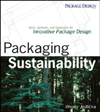Industry Voices
The Bipartisan Future of Sustainable Packaging: A Post-Election Path Toward Progress

Palouse Fiber Packaging’s 4-cup carriers made using wheat straw pulp. (Courtesy of Palouse Fiber Packaging)
Sustainability in packaging is a rare issue that, in theory, resonates across the entire political spectrum. From bottom-line focused business owners focused on trimming costs by reducing waste, to consumers seeking out eco-friendly products that protect their future, the shift toward sustainable business and packaging is a shared, common-sense goal.
Across-the-Aisle Opportunity + Building Consensus on Sustainability
On one side, the argument for alternative fiber packaging can focus on its innumerable economic benefits—creating myriad jobs in the sustainable materials sector. It can also be framed around the need to protect the environment for future generations and reduce our dependence on single-use plastics by innovating with new, unexpected renewable materials (like wheat – but we’re not biased or anything...) to produce our packaging.
While the federal government’s stance on sustainability may ebb and flow with each administration, local governments across the country are stepping up to fill the gap. States like Texas have seen a rise in corporate partnerships aimed at reducing environmental footprints, while Washington and Oregon are continuing to pass ambitious recycling laws, foam bans and other packaging waste reduction initiatives. The public-private partnerships in these states are a testament to the fact that sustainability is not a partisan issue—it’s about shared values, shared responsibility, and protecting the planet for future generations.
But sustainability is not just about government regulations; it’s increasingly about what companies are doing voluntarily. Leading corporations, regardless of political affiliations, are committing to reducing their environmental impact. These corporate commitments are pivotal in the push for sustainable packaging.
Voluntary + Measurable Corporate Commitments to Sustainability: A Growing Trend
Major companies like Unilever, Nestlé, and Coca-Cola have set ambitious goals to reduce plastic waste, improve recycling programs, and transition to 100% recyclable, reusable, or compostable packaging over the next few years. These commitments are not simply about regulatory compliance; they are about staying competitive in a consumer market that demands more from brands.
From large multinational corporations to small businesses, there’s a clear shift toward incorporating sustainability into the core of their brand values. This movement is not partisan; it’s based on the unquestionable understanding that consumers want to see American businesses set the curve on climate action. And as this bipartisan consensus grows, so will the opportunities for alternative fiber packaging companies to provide the solutions businesses need to meet sustainability goals.
New Administration + Opportunities, Same Bottom Line
The next four years pose an undeniably exciting opportunity for alternative fiber. With increasing corporate demand for sustainable materials and collaborative suppliers, there’s a tremendous market for businesses like Palouse Fiber Packaging that specialize in providing innovative, fiber-based solutions to businesses answering the call of their bottom line, eco-conscious customer base, or simply common sense.
About Palouse Fiber Packaging
Palouse Fiber Packaging is at the forefront of alternative packaging innovation, offering customized, future-friendly molded fiber solutions to customers across a variety of industries. The company aims to collaborate with visionary businesses seeking to enhance their ecological footprint and market appeal.
Looking for a reprint of this article?
From high-res PDFs to custom plaques, order your copy today!









